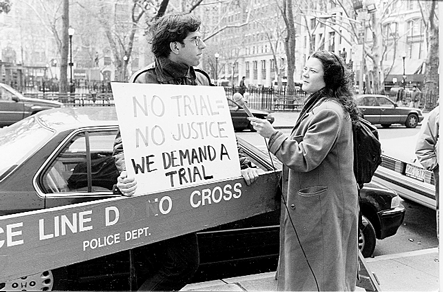Business owners plan First Amendment appeal to state’s high court
In Manhattan, a unanimous four-judge panel of the New York Appellate Division upheld recent amendments to regulations that are intended to sharply reduce the number of adult businesses in residential and business districts.
The April 12 ruling, explained in an opinion by Justice Eugene Nardelli, reversed two 2003 decisions by Supreme Court Justice Louis York, who ruled that the amendments violated the freedom of speech of sex shop owners.
Early in the Giuliani administration, officials sought to crack down on the proliferation of stores selling sexually explicit material, in response to complaints from some neighborhoods about bookstores and video shops, some with flashy, sexually-oriented signs. Under the original regulations, upheld by the state’s highest court in 1995, a business was categorized as an “adult” enterprise subject to the zoning regulation, if a certain amount of its inventory was sexually oriented.
The court, relying on both federal and state precedents, found that any burden on constitutionally-protected expression was justified by studies showing the adverse effects on quality of life, including property values, in neighborhoods where so-called adult businesses were situated. Some of the studies were undertaken by city agencies, such as the City Planning Department, while others were studies that had been conducted in other cities.
Many businesses providing sexually-oriented products that did not want either to close down or relocate to remote areas of the city removed from residential areas and designated by the zoning ordinance, modified their operations and physical layout to avoid the “adult” label. When the city, in a concerted enforcement effort in 1998, attempted to employ the ordinance against such businesses, prosecutors were stymied by regulations spelled out with such precise wording about inventory and shelf space percentages.
In 1999, in a case involving Les Hommes, a gay establishment on the Upper West Side that offered private video booths showing pornographic films, the state’s highest court, the Court of Appeals, ruled that the business that was in literal compliance with the floor space and inventory numbers could not be considered an adult enterprise under the zoning ordinance, even if it derived almost all its income from the adult uses. The city had argued that the “essential character” of such businesses should be determinative, and that their compliance was a “sham,” but the court decided otherwise.
The city then amended the regulations so that by 2001 the wording emphasized an establishment’s overall purpose, and not a specific floor space and inventory formula. Under the new rules, the question is no longer whether sexually-oriented parts of the business predominate, but whether there is any activity or product on the premises that falls within that category. For book and video stores, the new rules were framed to avoid including mainstream booksellers whose shelves contain sexually related titles.
Thus, any book or video store with individual enclosures for viewing adult films would be an adult business, no matter how much non-adult inventory it carries, as would be a store where customers would have to “pass through an area of the store with ‘adult printed or visual material’ in order to access an area of the store with ‘other printed or visual material.’” The amendments also focused on signs that emphasize the availability of adult materials.
In the recent lawsuits, sex shop owners argued that the city had not done any studies to show that the modified stores—called 60/40 businesses, the formula of the original zoning ordinance—generated the same undesirable effects on property values, crime and quality of life to justify treating them as “adult” establishments under the zoning ordinance. Because the services and goods provided by these businesses are protected under the First Amendment, the government may only restrict their operation for reasons not having to do directly with the nature of the speech, thus the search for “undesirable secondary effects.”
Justice York had found the lack of such studies to be a defect of constitutional proportions, and issued injunctions against enforcement. The Appellate Division disagreed and rejected the distinction, insisting that the original studies that were found to be adequate by the Court of Appeals in 1995 could be used to uphold the amendments.
The businesses will likely appeal this ruling, hopeful that the Court of Appeals will take a broader view than the appellate ruling of the constitutional questions. Typically, the intermediate appeals courts have tended to side with the city on the zoning of sex shops, but the Les Hommes ruling from 1999 suggests that the Court of Appeals, should it review the matter, may uphold the constitutional claims of sex shop owners.
Gov. George Pataki’s high-bench appointments have pushed the court to the right, making predictions on a ruling difficult.
gaycitynews.com


































